Ever wonder why grown adults get genuinely excited about cartoon characters on their coffee mugs? Japan's kawaii culture is the answer, and you don't need to master basic Japanese words to understand its global appeal. Only in Japan could a perpetually tired egg yolk (yes, Gudetama) achieve the same celebrity status as an iconic electric rodent (Pikachu's still reigning supreme).
Whether it's Japanese movies dominating your streaming queue or cute characters plastered on everything from kitchen appliances to phone cases, Japan has mastered making everyday life a little more delightful.
And if you think the characters are cute, wait until you dive into the Japanese language itself. Japanese takes cuteness to a whole new level with words that are literally designed to make you smile. Stick around, because we’re about to share over 20 of the most adorable Japanese words that’ll instantly make your vocabulary 100% more kawaii.
⛩️ 10 Japanese Basic Sentence Patterns For Beginners
⛩️ 7 Days Of The Week In Japanese: A Complete Guide
⛩️ How To Say Happy Birthday In Japanese In 7+ Easy Ways

What Makes Japanese Words Cute?
Japanese words sound cute because the language has evolved specific linguistic mechanisms that trigger our brain's "cute response." Research shows that certain consonant sounds like /p/, /ɾ/, and /m/ scientifically create kawaii feelings in Japanese speakers due to their labial, high-frequency, and sonorant properties.
The Japanese language has developed sophisticated linguistic tools specifically for expressing cuteness, known as 可愛い言葉 (kawaii kotoba) or cute words. These tools also come with four main techniques that the Japanese use to create these adorable expressions.
Adding Cute Endings
While it's technically an honorific suffix, it's basically a cute little stamp you can add to names or words to make them instantly more endearing. For example, when your friend Yuki becomes Yuki-chan (ゆきちゃん), it's like giving their name a warm, fuzzy hug!
Examples:
- Mari → Mari-chan (まりちゃん)
- Neko (cat) → Neko-chan (ねこちゃん)
Repeating Words
Japanese loves repeating sounds to create cuteness - it's like the linguistic equivalent of baby talk, but socially acceptable! Here's what it looks like:
| Regular Word | Cute Version | Meaning |
|---|---|---|
| 犬 (inu) | わんわん (wan-wan) | Dog → Woof-woof |
| 鳥 (tori) | ぴよぴよ (piyo-piyo) | Bird → Tweet-tweet |
| 人 (hito) | ひとひと (hito-hito) | Person → People-people |
Onomatopoeia
Japanese has an endless supply of sound words that are inherently cute. These words don't just describe sounds - they paint an adorable picture:
| Sound Word | Meaning | Used For |
|---|---|---|
| もぐもぐ (mogu-mogu) | Nom nom | Eating cutely |
| ふわふわ (fuwa-fuwa) | Fluffy fluffy | Soft, airy things |
| きらきら (kira-kira) | Sparkly sparkly | Glittering things |
When you combine these methods (like adding -chan to a repetitive word), you've hit peak kawaii! Just remember to use these cute forms appropriately - while they're super fun, they're usually casual and might not fit every situation.
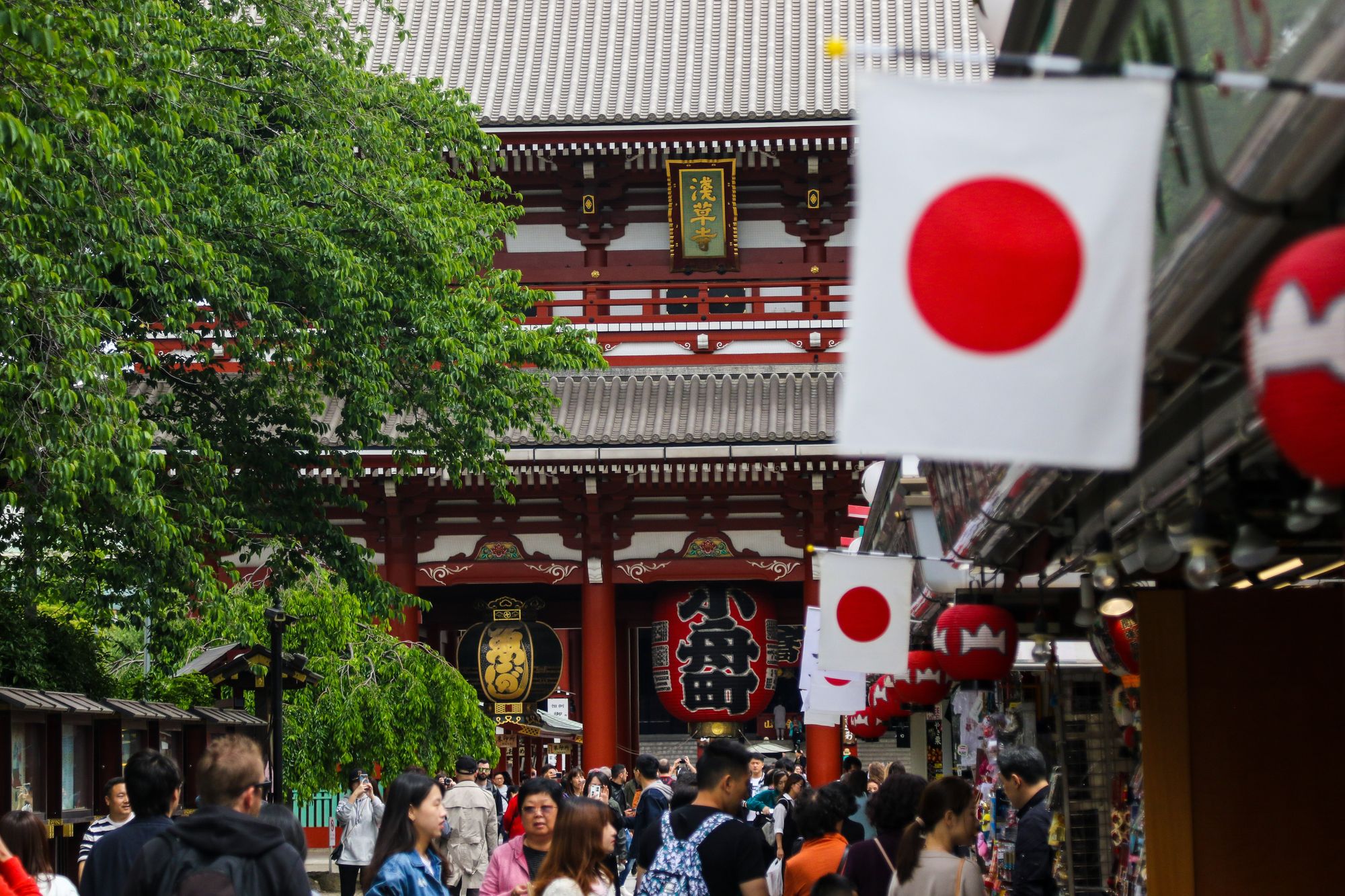
11 Cute Japanese Words For Beginners
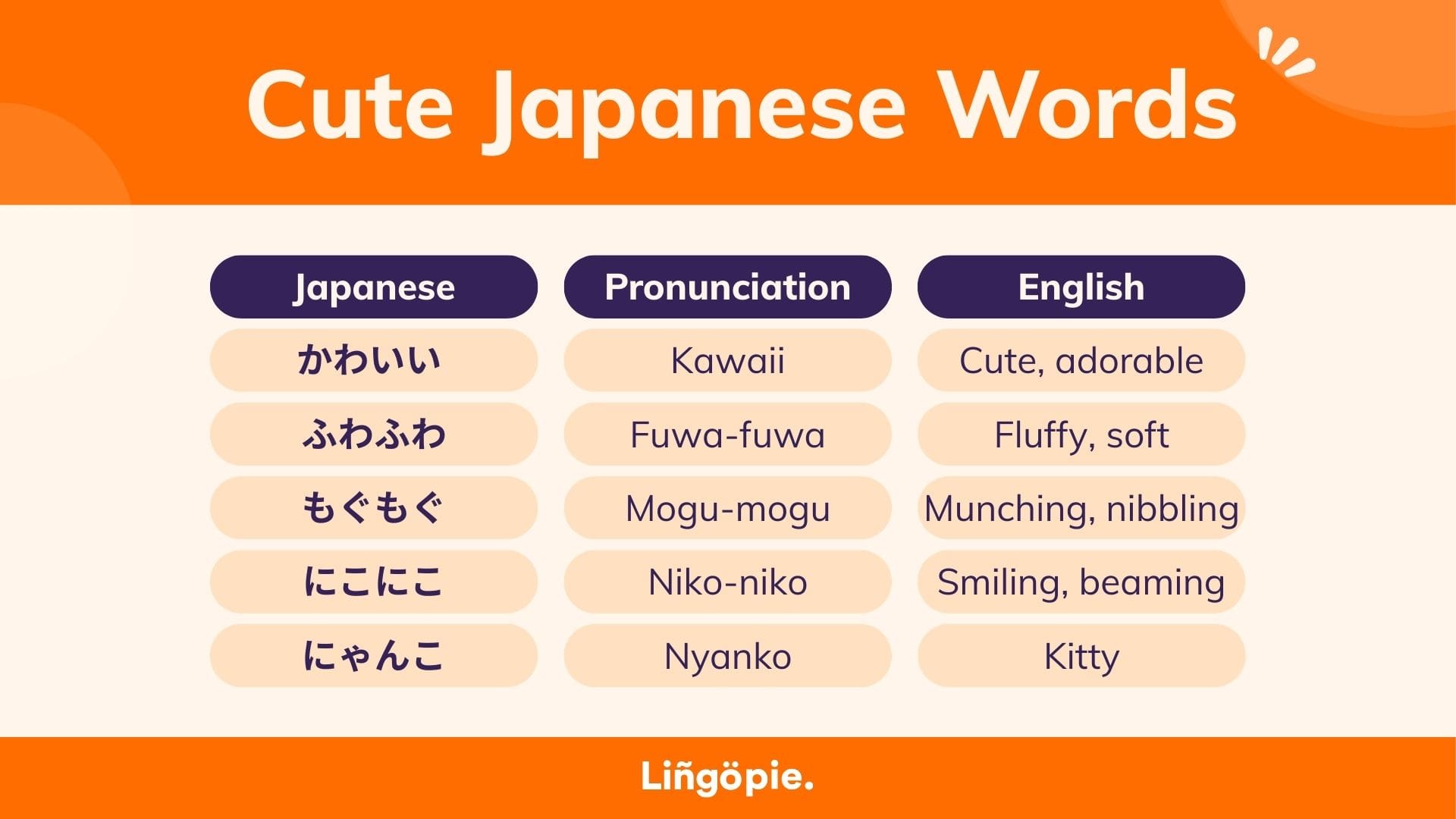
Let's start with the easiest (and most commonly used) cute Japanese words. These are the ones you'll hear everywhere - from Japanese anime to real-life conversations in Japan. Even if you're just starting out, these words are super easy to remember and use!
かわいい (Kawaii)
- Meaning: Cute, adorable
- Used for: Literally everything cute!
- Example: このパンダ、超かわいい!(Kono panda, cho kawaii!) - This panda is super cute!
ふわふわ (Fuwa-fuwa)
- Meaning: Fluffy, soft
- Used for: Describing soft things like clouds, cotton candy, or furry animals
- Example: このクッション、ふわふわだね!(Kono kusshon, fuwa-fuwa da ne!) - This cushion is so fluffy!
もぐもぐ (Mogu-mogu)
- Meaning: Munching, nibbling
- Used for: Describing cute eating sounds
- Example: 赤ちゃんがもぐもぐ食べてる (Akachan ga mogu-mogu tabeteru) - The baby is eating nom-nom!
にこにこ (Niko-niko)
- Meaning: Smiling, beaming
- Used for: Describing a bright, happy smile
- Example: にこにこしながら歩いてる (Niko-niko shinagara aruiteiru) - Walking while smiling happily
にゃんこ (Nyanko)
- Meaning: Kitty
- Used for: A cuter version of cat (猫 neko)
- Example: にゃんこが窓際で寝てる (Nyanko ga madogiwa de neteru) - The kitty is sleeping by the window
ぴよぴよ (Piyo-piyo)
- Meaning: Cheeping sound, baby bird
- Used for: Describing cute baby birds or bird sounds
- Example: ひよこがぴよぴよ鳴いてる (Hiyoko ga piyo-piyo naiteru) - The chick is cheeping cutely
きらきら (Kira-kira)
- Meaning: Sparkling, glittering
- Used for: Describing anything that sparkles or shines
- Example: 星がきらきら輝いてる (Hoshi ga kira-kira kagayaiteru) - The stars are twinkling
ころころ (Koro-koro)
- Meaning: Rolling, tumbling
- Used for: Describing something small and round moving cutely
- Example: ハムスターがころころ転がってる (Hamusutaa ga koro-koro korogatteru) - The hamster is rolling around cutely
うきうき (Uki-uki)
- Meaning: Cheerful, happy, excited
- Used for: Describing a light, happy feeling
- Example: 遠足でうきうきしている (Ensoku de uki-uki shiteiru) - Feeling excited about the field trip
ぷにぷに (Puni-puni)
- Meaning: Squishy, soft
- Used for: Describing soft, squeezable things
- Example: このぬいぐるみ、ぷにぷに!(Kono nuigurumi, puni-puni!) - This plushie is so squishy!
ゆめかわ (Yume-kawa)
- Meaning: Dreamy cute
- Used for: Describing something dreamily cute
- Example: このドレス、超ゆめかわ!(Kono doresu, cho yumekawa!) - This dress is super dreamy-cute!
12 Cute Japanese Words For Intermediate Learners
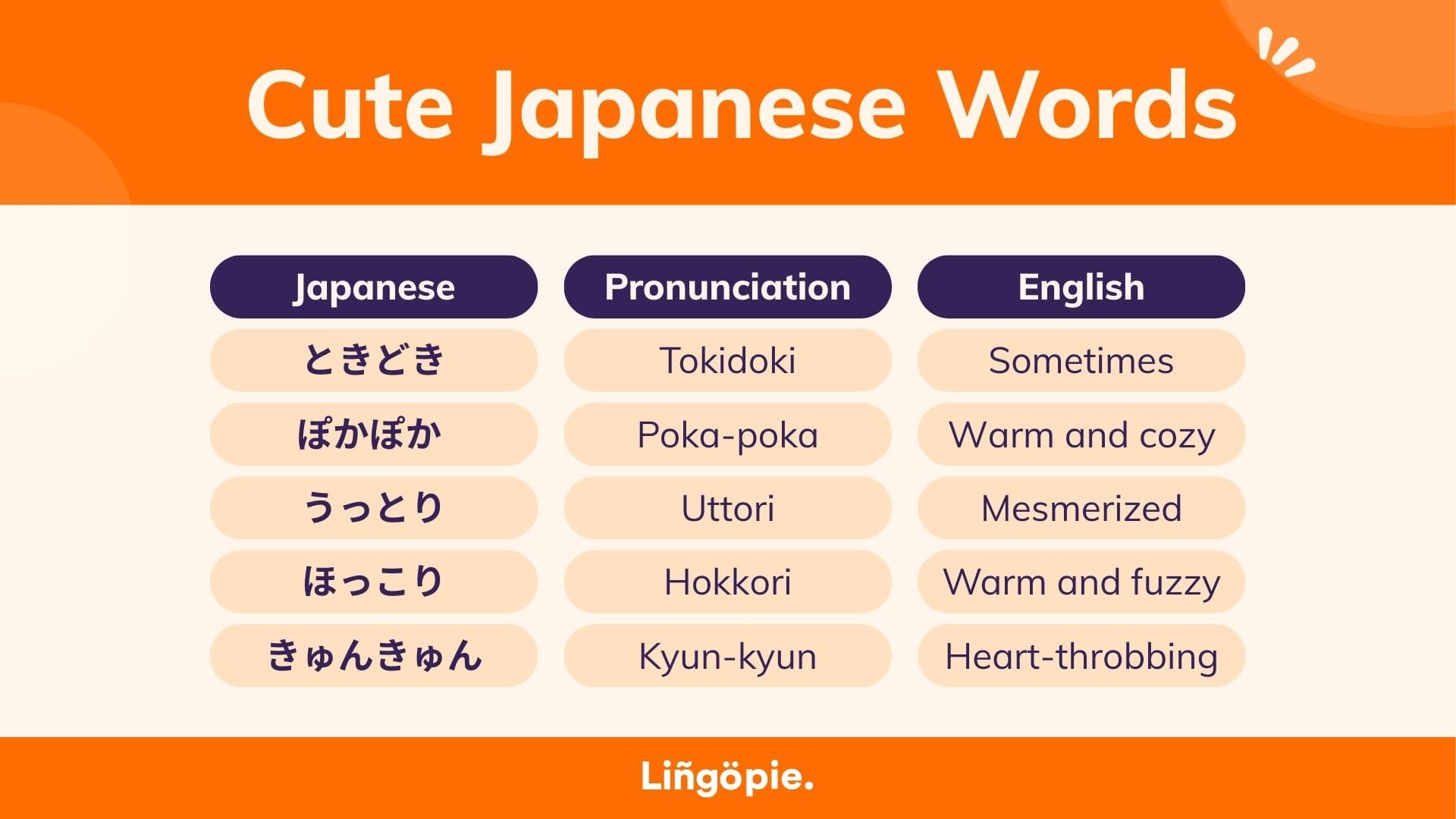
Now that we've covered the basics, let's level up your kawaii vocabulary! These words are a bit more specific and nuanced, but they're super useful for describing those uniquely adorable Japanese moments.
ときどき (Tokidoki)
- Meaning: Sometimes, occasionally
- Used in cute contexts: Often used to describe endearing habits
- Example: うちの猫はときどき変な顔をする (Uchi no neko wa tokidoki hen na kao wo suru) - My cat sometimes makes funny faces
ぽかぽか (Poka-poka)
- Meaning: Warm and cozy
- Used for: Describing comforting warmth (like sunlight or a warm drink)
- Example: 春の日差しがぽかぽかする (Haru no hizashi ga poka-poka suru) - The spring sunlight is warm and cozy
うっとり (Uttori)
- Meaning: Enchanted, mesmerized
- Used for: Being captivated by something beautiful
- Example: かわいい赤ちゃんを見て、うっとりした (Kawaii akachan wo mite, uttori shita) - I was enchanted watching the cute baby
ほっこり (Hokkori)
- Meaning: Warm and fuzzy feeling
- Used for: Describing heartwarming situations
- Example: その話を聞いて、ほっこりした (Sono hanashi wo kiite, hokkori shita) - That story gave me warm fuzzy feelings
きゅんきゅん (Kyun-kyun)
- Meaning: Heart-throbbing
- Used for: When something is so cute it makes your heart skip
- Example: 彼の笑顔できゅんきゅんした (Kare no egao de kyun-kyun shita) - His smile made my heart flutter
すやすや (Suya-suya)
- Meaning: Sleeping peacefully
- Used for: Describing someone sleeping cutely
- Example: 赤ちゃんがすやすや眠っている (Akachan ga suya-suya nemutteiru) - The baby is sleeping peacefully
ぷるぷる (Puru-puru)
- Meaning: Wobbly, jiggly
- Used for: Describing cute wiggly things like pudding or jelly
- Example: プリンがぷるぷる揺れている (Purin ga puru-puru yurete iru) - The pudding is jiggling cutely
ピカピカ (Pika-pika)
- Meaning: Sparkly, shiny new
- Used for: Describing something gleaming or brand new
- Example: 新車がピカピカに輝いている (Shinsha ga pika-pika ni kagayaiteiru) - The new car is gleaming
ハイタッチ (Hai tacchi)
- Meaning: High five
- Used for: A playful way to celebrate
- Example: 成功を祝ってハイタッチした (Seikou wo iwatte hai tacchi shita) - We high-fived to celebrate our success
ベビーカー (Bebii kaa)
- Meaning: Baby stroller/carriage
- Note: While not inherently "cute," Japanese often uses this borrowed English term in a cute way
- Example: かわいいベビーカーを押してるママ (Kawaii bebiikaa wo oshiteru mama) - A mom pushing a cute stroller
ペロペロ (Pero-pero)
- Meaning: Licking sound
- Used for: Describing cute licking (like puppies or ice cream)
- Example: 犬が顔をペロペロ舐める (Inu ga kao wo pero-pero nameru) - The dog is giving cute little licks
きれい (Kirei)
- Meaning: Beautiful, pretty, clean
- Used for: Describing something elegantly cute or beautiful
- Example: この花、とてもきれいね (Kono hana, totemo kirei ne) - This flower is so pretty
8 Cute Japanese Words For Advanced Learners
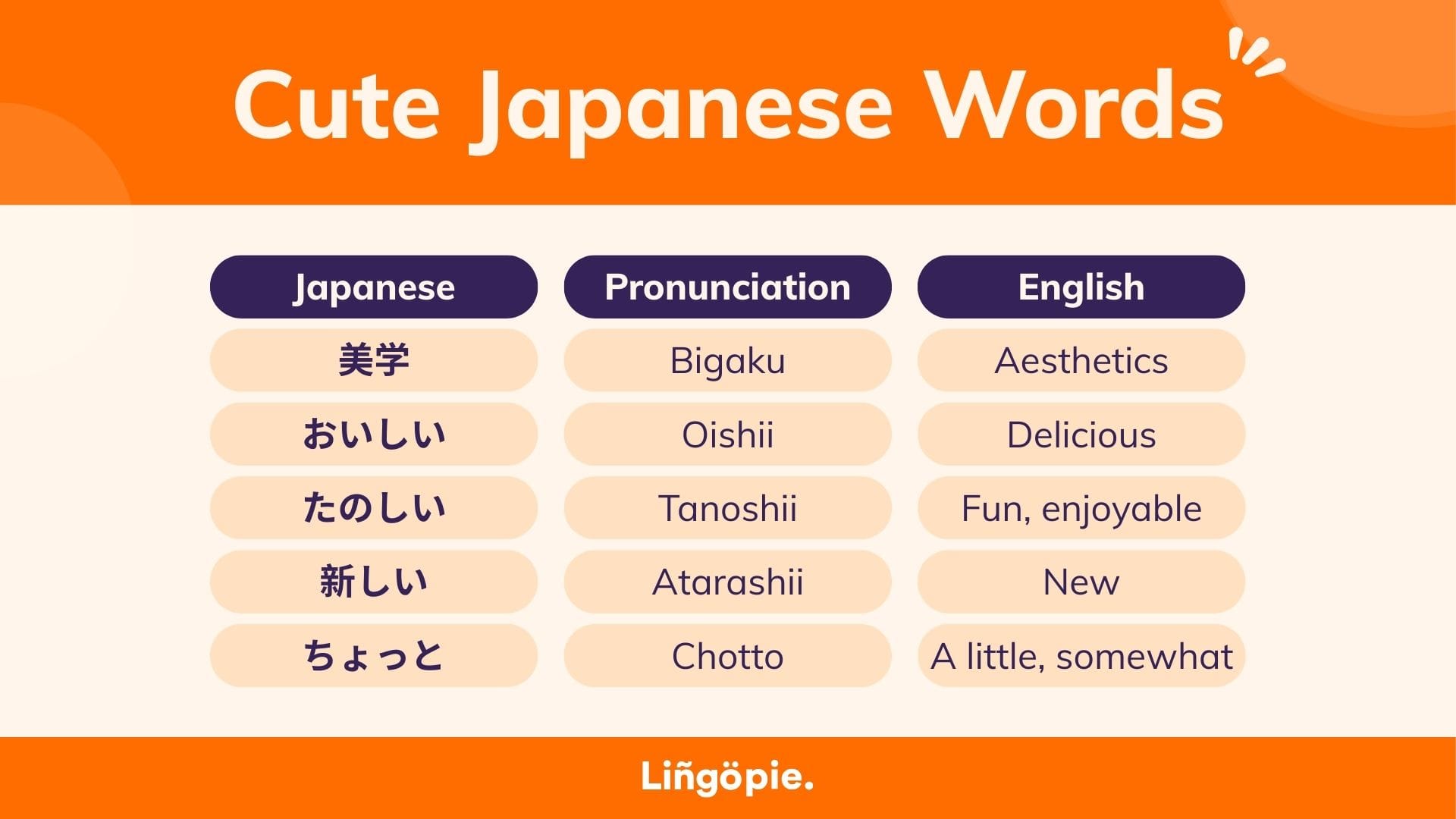
Ready to master the most sophisticated levels of Japanese cuteness? These words and expressions take kawaii to a whole new level, showing how Japanese can express beauty and cuteness in more nuanced ways.
美学 (Bigaku)
- Meaning: Aesthetics, the study of beauty
- Used for: Describing one's personal philosophy of cuteness or beauty
- Example: 彼女の可愛い美学は独特だ (Kanojo no kawaii bigaku wa dokutoku da) - Her sense of cuteness is unique
おいしい (Oishii)
- Meaning: Delicious
- Used in cute context: Often used with a sweet, high-pitched tone for extra cuteness
- Example: このケーキ、超おいしい~!(Kono keeki, cho oishii~!) - This cake is super yummy!
たのしい (Tanoshii)
- Meaning: Fun, enjoyable
- Advanced usage: Often combined with other words to create cute compounds
- Example: 楽しい時間があっという間に過ぎた (Tanoshii jikan gaatto iu ma ni sugita) - The fun time passed so quickly
新しい (Atarashii)
- Meaning: New
- Cute context: Often used to express excitement about new cute things
- Example: 新しいぬいぐるみがめっちゃ可愛い!(Atarashii nuigurumi ga meccha kawaii!) - The new plushie is super cute!
ちょっと (Chotto)
- Meaning: A little, somewhat
- Advanced usage: Used to make statements sound cuter or more modest
- Example: ちょっと恥ずかしいけど... (Chotto hazukashii kedo...) - It's a bit embarrassing but...
美しい (Utsukushii)
- Meaning: Beautiful
- Advanced context: More refined than かわいい, suggesting elegant beauty
- Example: 美しい桜が舞い散る (Utsukushii sakura ga maichiru) - Beautiful cherry blossoms dancing in the air
愛郷 (Aikyou)
- Meaning: Charm, winsome quality
- Used for: Describing natural, endearing cuteness
- Example: 彼女は愛嬌たっぷりの性格だ (Kanojo wa aikyou tappuri no seikaku da) - She has such a charming personality
蝶々 (Chou chou)
- Meaning: Butterfly
- Poetic usage: Often used in cute or romantic contexts
- Example: 蝶々のように優雅に舞う (Chou chou no you ni yuuga ni mau) - Dancing gracefully like a butterfly
How To Express Cuteness In Japanese
Want to put all these cute words into action? Here's a super easy sentence pattern that'll help you express cuteness in Japanese! Just plug in different words, and you're ready to go.
Basic Sentence Pattern: [Thing/Person] + が/は + とても/超 + かわいい/可愛い です ([Thing/Person] + ga/wa + totemo/cho + kawaii desu) Meaning: [Thing/Person] is very/super cute!
With Animals
- この犬はとても可愛いです。 (Kono inu wa totemo kawaii desu) This dog is very cute!
With Objects
- このぬいぐるみが超かわいいです! (Kono nuigurumi ga cho kawaii desu!) This plushie is super cute!
With People
- 妹はとても可愛いです。 (Imouto wa totemo kawaii desu) My little sister is very cute!
Cute Japanese Words Used Online
Modern Japanese netizens have developed shortened, stylized versions of classic cute words that are perfect for quick typing and character limits:
- ぴえん (Pien) - The ultimate expression of cute sadness or disappointment, often accompanied by the pleading face emoji (🥺). It's evolved from a simple sound to represent everything from minor inconveniences to dramatic emotional moments.
- ぱおん (Paon) - An even more dramatic version of "pien," used when you're feeling extra emotional or want to express cute despair.
- やばたにえん (Yabatanien) - A playful elongation of "yabai" (amazing/terrible) that sounds like a cute monster name, used to express something overwhelmingly cute or shocking.
- きゅんです (Kyun desu) - Based on the heart-eyes emoji feeling, used when something makes your heart skip a beat
- ふわっと (Fuwatto) - Describes that soft, dreamy feeling you get from cute content online
- きらきらタイム (Kira-kira time) - "Sparkly time" used to describe moments worth posting on social media
- がんばるぞい (Ganbaru zoi) - A cute way to say "let's do our best!" popularized by anime and gaming streams
- わこつ (Wakostu) - Short for "waku waku otsukaresama," meaning "exciting good work," used to greet streamers
- ぽんぽん (Pon-pon) - Used in gaming to describe cute, bouncy movements or sounds
This digital evolution of kawaii language shows how traditional Japanese cuteness continues to adapt and thrive in modern communication, creating new ways for young people to express joy, excitement, and adorable emotions in the digital space.
Learning Cute Japanese Through Anime
If you're looking to hear these adorable Japanese words in action, anime is your perfect study buddy! Japanese animation is packed with kawaii expressions, and you'll often hear these words used naturally in different situations.
Plus, anime characters are masters at adding that extra cute flair to their speech - perfect for learning how to nail those adorable expressions!
- Sailor Moon (美少女戦士セーラームーン) - Classic magical girl series where you'll hear tons of cute expressions, especially in Usagi's iconic catchphrases and transformations.
- Lucky Star (らき☆すた) - This slice-of-life comedy is basically a masterclass in how real Japanese high school girls use cute language in everyday situations.
- Fruits Basket (フルーツバスケット) - Perfect blend of romantic moments and daily life scenarios where characters naturally use sweet and endearing expressions.
- My Neighbor Totoro (となりのトトロ) - Ghibli's heartwarming creature uses simple, clear Japanese with plenty of adorable expressions that are easy to catch.
- Pokémon (ポケットモンスター) - The perfect starter anime for Japanese learners, with simple dialogue and lots of repetitive cute expressions.
Want to take your Japanese learning to the next level? Check out Lingopie! With Lingopie, you can watch these anime and thousands of other Japanese TV shows and movies with interactive subtitles, vocabulary tracking, and learning tools designed to help you master Japanese naturally.
Start your language journey today and transform those kawaii words from your study list into natural speech!
Ready to Get Your Kawaii On?
There you have it - your ultimate guide to speaking the language of cute! Whether you're watching Japanese movies, chatting with friends, or just expressing your love for all things adorable, these words will make your Japanese sound instantly more natural and fun.
Now if you find yourself itching to learn Japanese, then we have one recommendation: Lingopie! With thousands of hours of Japanese shows, movies, and anime from Lingopie Originals, you'll learn these cute expressions (and so much more) in their natural context.





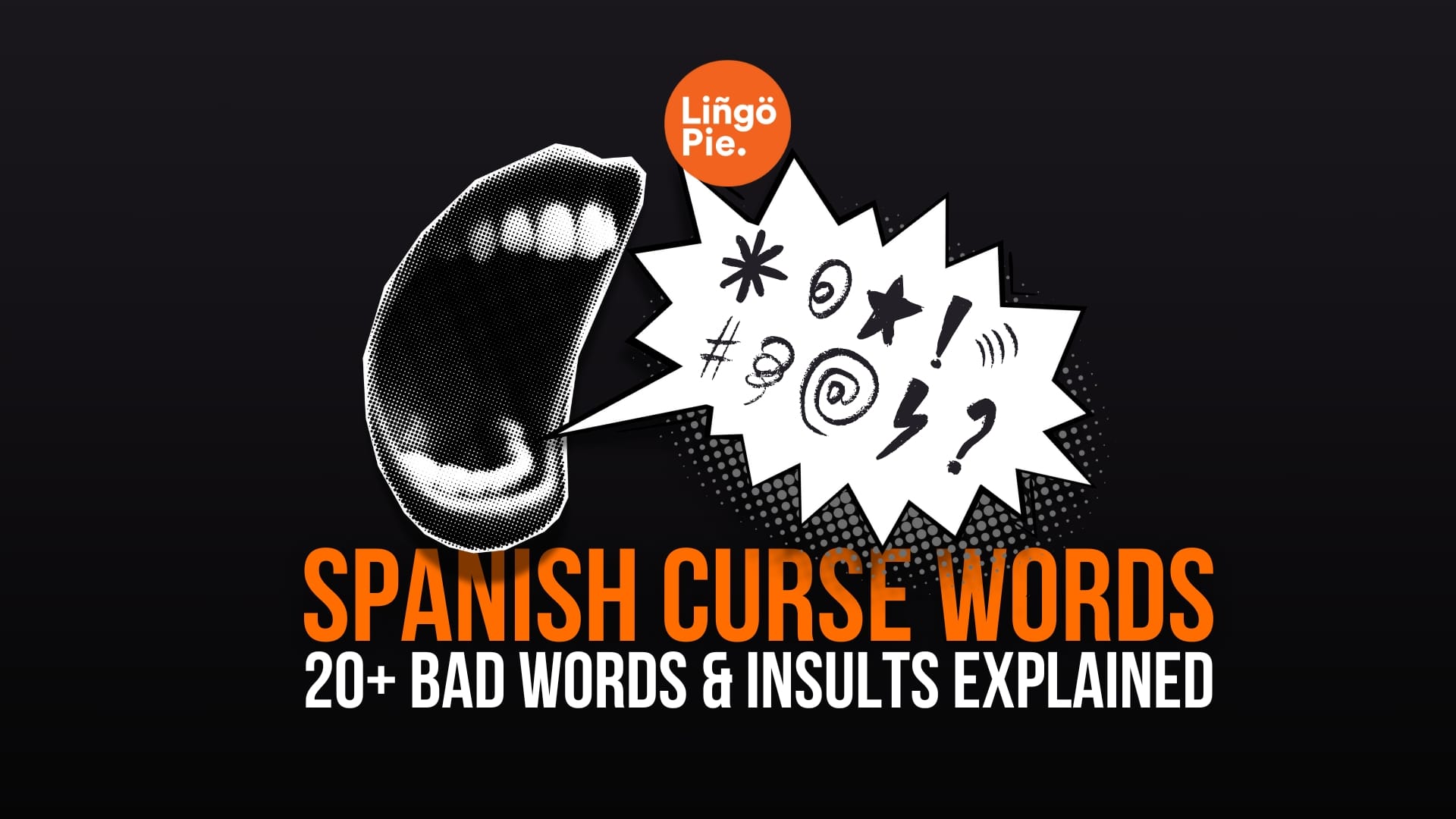
![10 Best Horror Anime For Learning Japanese [Guide]](/blog/content/images/size/w1200/2026/01/Japanese-horror-anime--1-.jpg)

![12 Best Japanese TV Shows To Learn Japanese [2026]](/blog/content/images/size/w300/2023/09/C-pia-de-imgs-blog---Spanish-1--10-.png)
![How To Write The Japanese Kanji For Love [+ FREE Printable]](/blog/content/images/size/w300/2025/03/Japanese-Kanji-for-Love-1.jpg)
